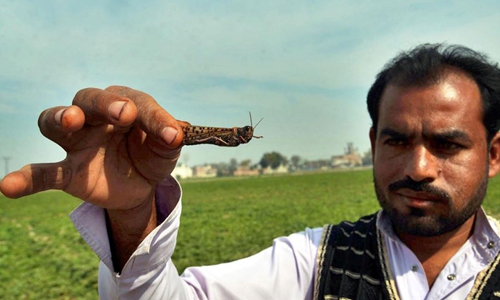HOME >> SOURCE
China has pesticides, equipment ready to aid locust fight in Pakistan, India
By Chu Daye Source:Global Times Published: 2020/2/25 18:23:40

Photo taken with mobile phone on February 15, 2020 shows a farmer displaying a locust in Okara district in eastern Pakistan's Punjab province. (Str/Xinhua)
China's proven locust-fighting methodologies - using special pesticides to high-tech drones - could help India and Pakistan fight the worst locust plague in decades, Chinese analysts said on Tuesday.
India and Pakistan have been fighting a locust plague that originated in the Horn of Africa and descended into South Asia, which poses extreme danger for food security. There have also been fears that it may spread to China.
A group of Chinese pest control experts arrived in Pakistan on Monday to provide technical assistance in its fight against the invading locusts, according to China's Ministry of Agriculture and Rural Affairs.
The experts will visit the Pakistani provinces of Sindh and Balochistan where the cropeating swarms had ravaged local agriculture, endangering Pakistan's grain harvest in the coming months.
India, too, has been affected by locust attacks but was reportedly able to keep the swarms under control. It was reported that the country has been purchasing drones and special equipment to ramp up the fight on the locusts. A small swarm eats as much in one day as about 35,000 people, according to the United Nation's Food and Agriculture Organization.
Experts say India should also work with China to fight the locust plague.
"If India has a need, the two governments should create opportunities for civilian cooperation on the control and prevention of the desert locusts," He Xiongkui, a professor with China Agricultural University and an expert in pesticide and specialized equipment, told the Global Times.
China has three to four types of organophosphate insecticide including malathion that can be exported to fight the locust plague, according to He. Not many countries continue to produce the insecticide, but China has maintained its production capacity, He said. It is the world's top exporter of pesticides.
China also exports a fungus that poisons locusts, turning them into mossy lumps. In addition to pesticides, China can also provide methodologies and all required equipment from planes to land-based water cannons.
Chinese Ambassador to Pakistan Yao Jing said last week that the Chinese government is considering supplying pesticides and spraying equipment to Pakistan.
Other countries affected by the locust plague are also soliciting help from China, including the procurement of high-tech drones and unmanned vehicles that can operate via remote control.
Chinese agricultural drone maker XAG said it had received urgent inquiries from customers in Kenya about its agricultural equipment including drones and autonomous vehicles.
"The problem is that, with the ongoing COVID-19 attack, overseas logistics are affected and this has impeded the deals," the company said in an email sent to the Global Times on Tuesday.
In China, drones spray pesticides to control locusts and are an integral part of the country's overall pest control system.
Consumer drone leader DJI also told the Global Times that it has already shipped several of its latest-model agricultural drones to its Kenyan customers.
"It is not a formal business yet and more of a trial. We supplied our drones to work with pesticide suppliers and agricultural tech companies," an employee of DJI's PR department told the Global Times.
He, the pesticide expert, said drones are of no use when fighting a mature and migrating swarm of desert locusts, as the sturdy insects could bring down the drones. But he noted that the drones can be of great use as they are more economical than planes in raiding locusts' breeding grounds in lush vegetation near rivers and lakes.
China's Ministry of Finance on Friday said it has allocated 1.4 billion yuan ($200 million) to fight and control pests including fall armyworms and locusts.
A Chinese agriculture ministry official said in February that the chance of desert locusts invading China exists.
RELATED ARTICLES:
Posted in: ECONOMY